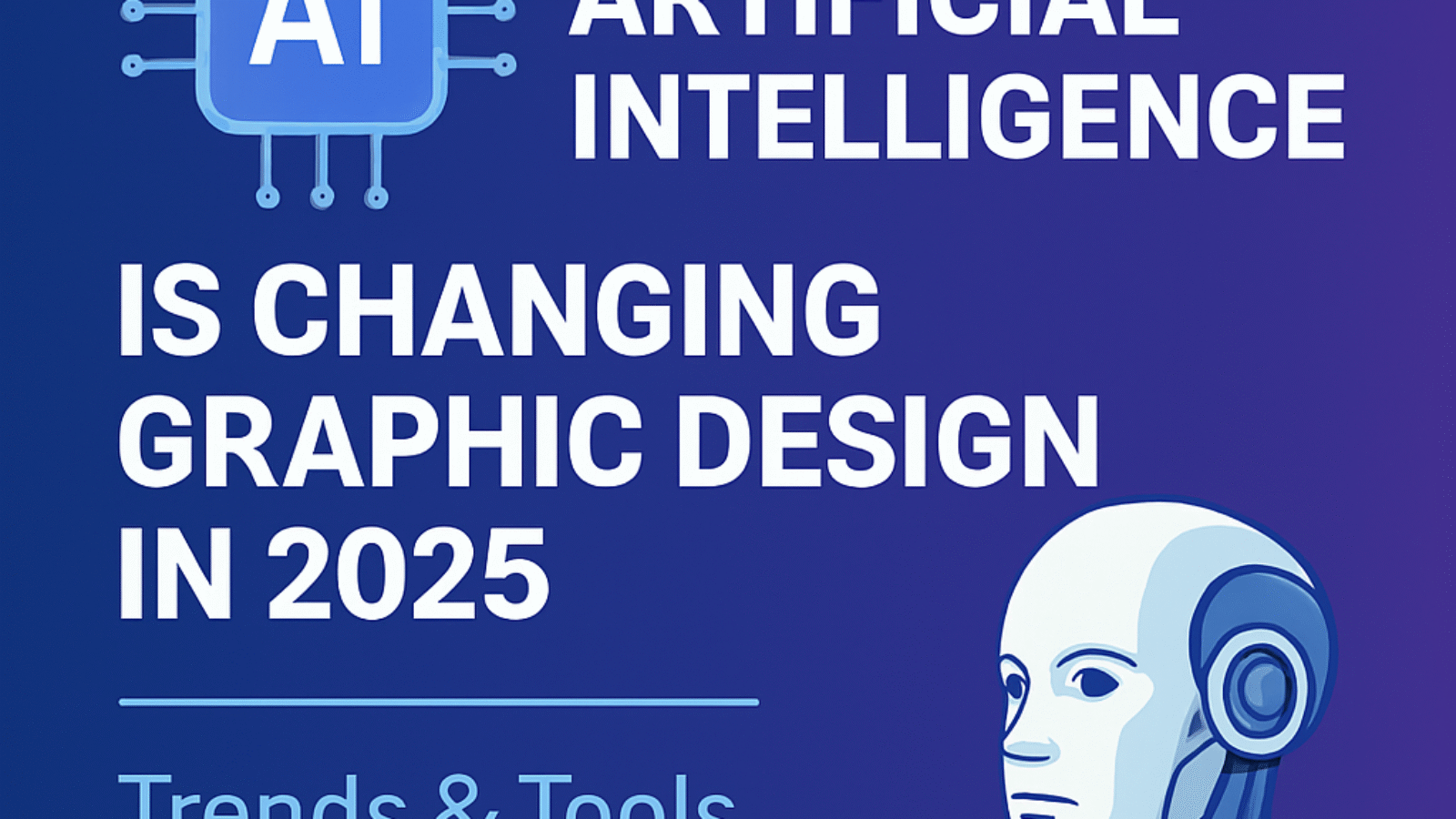The world of graphic design is evolving faster than ever, and Artificial Intelligence (AI) is playing a massive role in this transformation. From automating repetitive design tasks to creating personalized graphics in seconds, AI is changing the way designers work and how businesses approach creativity.
Here’s a complete breakdown of how AI is revolutionizing graphic design in 2025:
🔹 What is AI in Graphic Design?
- Artificial Intelligence (AI) in graphic design refers to the use of smart tools, algorithms, and software to automate design processes.
- AI can generate images, suggest layouts, enhance visuals, and personalize content without requiring advanced manual effort.
- Instead of replacing designers, AI works as a powerful assistant that boosts creativity and efficiency.
🔹 Key Ways AI is Changing Graphic Design
- Automated Design Creation
- AI tools can generate logos, banners, and templates within minutes.
- Platforms like Canva AI, Adobe Sensei, and Fotor AI help even beginners create professional designs.
- Faster Workflow & Efficiency
- Designers save hours by automating repetitive tasks like resizing, color correction, and formatting.
- This allows them to focus more on creative ideas instead of manual adjustments.
- AI-Powered Image Generation
- Tools like DALL·E, MidJourney, and Stable Diffusion can generate custom images from text prompts.
- Designers can quickly bring abstract concepts to life with AI-generated visuals.
- Personalized & Targeted Graphics
- AI analyzes user data and suggests graphics that resonate with specific audiences.
- Brands can deliver personalized marketing visuals based on customer behavior.
- Smart Design Suggestions
- AI software can recommend color palettes, typography, and layouts for a more professional look.
- Designers can get instant feedback on what works best for their project.
- Enhanced Photo Editing
- AI-powered editors like Luminar AI and Photoshop AI tools can remove backgrounds, enhance images, and retouch photos automatically.
- This makes high-quality editing accessible to everyone.
- Voice and Gesture-Based Design
- Emerging AI tools allow designers to create graphics using voice commands or gestures.
- This trend will grow as human-computer interaction becomes more natural.
🔹 Benefits of AI in Graphic Design
- Saves time and effort by automating tasks.
- Increases productivity and allows faster project delivery.
- Makes professional design tools accessible to non-designers.
- Helps brands maintain consistent branding across platforms.
- Encourages creativity by providing endless design suggestions.
- Enables cost-effective solutions for startups and small businesses.
🔹 Challenges of AI in Graphic Design
- Over-Reliance on Templates – Designs may look generic if everyone uses the same AI tools.
- Lack of Human Emotion – AI struggles to capture deep creativity and emotions that human designers bring.
- Copyright & Ethics Issues – Concerns over originality of AI-generated content.
- Skill Gap – Designers must learn how to work with AI tools rather than fear being replaced.
🔹 Future of AI in Graphic Design (2025 & Beyond)
- Hyper-Personalized Designs – AI will create unique visuals tailored for each customer.
- AI + Human Collaboration – Designers will focus on creativity while AI handles execution.
- 3D & AR/VR Design Growth – AI will power immersive experiences in virtual and augmented reality.
- Smarter Brand Identity Tools – Businesses will be able to design full branding kits within minutes.
- Ethical AI Design Practices – More focus on originality, copyright, and ethical AI use.
🔹 Popular AI Tools in Graphic Design
- Canva AI – Easy-to-use platform with AI-generated templates.
- Adobe Sensei – AI-powered features for Photoshop, Illustrator, and Premiere Pro.
- Figma AI Plugins – Collaborative design with AI automation.
- DALL·E & MidJourney – Image generation from text prompts.
- Looka & LogoAI – Automated logo creation for businesses.
🔹 Real-Life Examples of AI in Graphic Design
- Netflix uses AI to generate personalized thumbnails for each viewer.
- Spotify uses AI to create engaging playlist covers based on user behavior.
- Coca-Cola launched an AI-powered campaign where users could generate their own Coke-themed art.
🔹 FAQs About AI in Graphic Design
Q1: Will AI replace graphic designers?
No. AI will assist designers by automating tasks, but human creativity, emotion, and originality are still irreplaceable.
Q2: Is AI graphic design suitable for beginners?
Yes. Platforms like Canva AI and Looka allow beginners to create professional designs easily.
Q3: Are AI-generated designs original?
AI generates content based on existing datasets, so originality can be a concern. Designers should use AI as support, not a replacement.
Q4: What skills should designers focus on in the AI era?
Designers should focus on creativity, branding, storytelling, and mastering AI tools for maximum impact.
🔹 Conclusion
AI is not here to replace graphic designers — it’s here to empower them. By automating repetitive tasks and providing endless creative possibilities, Artificial Intelligence in graphic design helps designers work smarter, not harder. The future of design is a blend of human creativity and AI innovation, making 2025 an exciting time for the industry.
Businesses that embrace AI-driven graphic design tools will not only save time and money but also create more engaging, personalized, and professional visuals for their audience.


Add a Comment